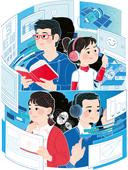Ministries say epidemic control and prevention the priority for schools
 (SHI YU / CHINA DAILY)
(SHI YU / CHINA DAILY)
Donning her school uniform and a red scarf, He Xin took part in her primary school's flag-raising ceremony, a tradition at the start of each semester, only this time she was standing in her family's living room and watching the ceremony live online, like hundreds of fellow students.
Monday was originally planned to be the start of the spring semester for middle and primary schools in Beijing. However, as part of efforts to curb the novel coronavirus pneumonia outbreak, the start of the semester has been delayed, with Monday instead marking the start of online courses being offered to students.
To facilitate the online learning activities, Xin's family, who live in Beijing's Haidian district, helped the 9-year-old register for an account on the Tencent QQ instant messaging platform to join the online chat group initiated by her teachers.
The extended holiday has offered students an opportunity to make their own decisions, plans and arrangements
Chu Zhaohui, researcher at the National Institute of Education Sciences
It offers the third-grader a timetable that includes morning exercise for half an hour, reading, mathematics, English and a feedback session with the teacher at the end of the day.
The Ministry of Education and the Ministry of Industry and Information Technology said in a joint notice on Wednesday that epidemic control and prevention remained the top priority for schools nationwide.
The country will make learning resources available to primary and middle school students for free through a number of online and television channels, including cloud platforms and online schools, the notice said.
The two ministries warned that after-school training institutions must not take the place of schools during the process, saying that local authorities and schools must step up guidance to students on the selection of learning materials and the framing of study plans.
They also called on schools to refrain from increasing the burden on students, with measures to avoid long hours of studying online and learning beyond the curriculum.
Schools should not require students to register their attendance online or upload videos of their participation, the notice said, adding that students must be given a reasonable amount of rest time.
It emphasized that protecting students' eyesight must be a priority, with measures to expand rest periods and encourage physical activity.
Lyu Yugang, head of the Ministry of Education's Department of Basic Education, said schools must not use home-schooling to replace their normal curriculum.
"When the classes reopen, local authorities and schools must carefully assess the quality of the students' learning and come up with targeted teaching plans," he told a news briefing on Wednesday.
He also stressed the importance of extending more help to the children of medical workers fighting on the front line to curb the outbreak and rural children left behind by parents migrating to urban areas for jobs.
"We need to ensure that every student has already grasped the knowledge in online courses before starting new courses," Lyu said.
Despite the authorities' repeated reminders about the need to ensure adequate rest periods, Xin's parents are still worried about her eyesight.
To complete her online learning, Xin needs to use a laptop and a cellphone to receive messages from her teachers.
"We do not have other options. It was the only way to make sure she can keep up her schooling," said Zhou Ying, her mother.
"She also missed her classmates and kept asking when she could meet them. We could not give an answer."
Zhou said her daughter had already been using instant messaging tools to stay in touch with fellow students, which exacerbated their concerns about her eyesight.
"We can only hope that either I or her father can continue to be able to work from home. Otherwise we will have a babysitting problem," she said.
Chu Zhaohui, a researcher at the National Institute of Education Sciences, said it would be a better option for schools to use the time before schools reopen to encourage students to learn on their own initiative.
"The extended holiday has offered students an opportunity to make their own decisions, plans and arrangements," he said. "It will spur them to take more initiative, boost their confidence, exercise more self-control and improve their self-learning abilities."


